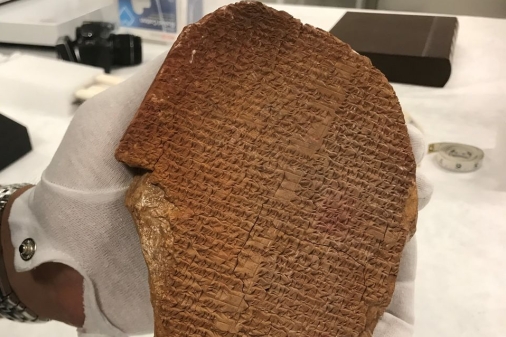
The Museum of the Bible has been forced to give up an ancient cuneiform fragment bearing a portion of the Epic of Gilgamesh, one of the world's oldest poems.
The Gilgamesh Dream Tablet originates from Iraq and was bought from an auction house in 2014 by Hobby Lobby, the owners of the Washington DC-based Museum of the Bible.
Federal agents confiscated the item from the museum in 2019 over fears it was brought illegally into the US.
The Department of Justice alleges that the tablet was purchased in 2003 from the relative of a London coin dealer and sent by international post to the US by an American antiquities dealer and cuneiform expert without the contents being declared.
It was then sold in 2007 with a false letter of provenance claiming that the tablet had been inside a box of miscellaneous ancient bronze fragments purchased in a 1981 auction.
The fragment was then sold several times more in various countries along with the false provenance letter before ending up in a London auction house, which sold it to Hobby Lobby in 2014 through a private sale.
This week the US District Court for the Eastern District of New York ordered the forfeiture of the Gilgamesh Dream Tablet from the museum.
Assistant Attorney General Kenneth A Polite Jr, speaking on behalf of the Department of Justice, said, "Forfeiture of the Gilgamesh Dream Tablet demonstrates the Department's continued commitment to eliminating smuggled cultural property from the US art market.
"Thwarting trade in smuggled goods by seizing and forfeiting an ancient artifact shows the department's dedication to using all available tools, including forfeiture, to ensure justice."
Peter C Fitzhugh, of Homeland Security Investigations (HSI), New York, said, "The trafficking of cultural property and art is a lucrative criminal enterprise that transnational criminal organizations exploit to make a profit, regardless of its destructive consequence to cultures around the globe.
"HSI continues to partner in art and antiquities investigations to ensure looted pieces are no longer trafficked through commerce for an illicit profit, because the cultural value of this tablet that travelled the world under false provenance exceeds any monetary value."
The Museum of the Bible did not respond to a request for comment, but said last year that it was cooperating with federal authorities on the item and its return to Iraq.
"We support the Department of Homeland Security's efforts to return this Gilgamesh fragment to Iraq," the museum said.
It added, "Before displaying the item in 2017, we informed the Embassy of Iraq that we had the item in our possession but extensive research would be required to establish provenance. We have continued these private discussions with Iraqi officials.
"We announced previously that we would be assisting in the return of items to Iraq and Egypt, and we have cooperated with Homeland Security on all of these matters."













